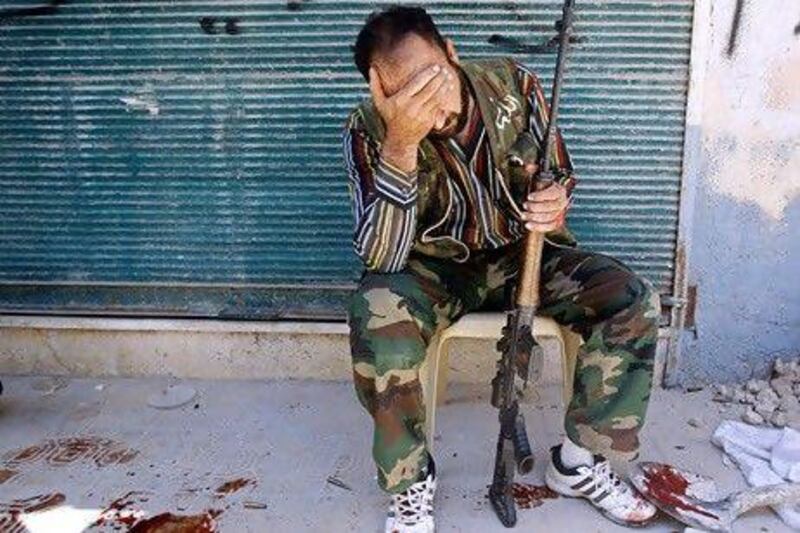ISTANBUL // Rebels briefly occupied the Syrian state media building in Aleppo yesterday as regime forces tried to break through the city's rebel-held areas with helicopters and machineguns.
One rebel was killed and four were wounded in the attack on the media HQ after government snipers surrounded it and began picking off rebels.
"As soon as morning came, the army started shooting," said rebel fighter Mu'awiya Al Halabi, 19.
Abdel Jabar Al Oqaidi, commander of the rebel Free Syrian Army in Aleppo, said the district of Salaheddin had "come under the heaviest bombardment since the battle began" on July 20 but that regime forces had "not managed to advance".
A regime official warned the battle for the city had not yet begun and called the fighting an "appetiser". "The main course will come later," he said.
The rebels know the capture of Syria's largest city and business hub would be a devastating blow to Bashar Al Assad, Syria's president.
But the opposition remains fragmented. Opposition leader Haitham Maleh announced a new council last week with the task of forming a transitional government.
Mr Maleh said he and other opposition figures formed the Trustees of the Syrian Revolution Council because the Syria National Council had failed "to deliver on its promises to the Syrian people".
Until last month Aleppo had largely the violence of the 17-month uprising against Mr Al Assad's rule, but residents, activists and rebels described an escalation in the fighting in the city.
The intensifying violence came as Qatar's prime minister, Sheikh Hamad bin Al Thani, said Doha would not accept a replacement for Kofi Annan - who announced his resignation last week as the joint United Nations-Arab League peace envoy - unless a "peaceful transfer of power" were explicitly part of the new envoy's mandate.
"Arab nations will not accept a new envoy with the same mandate that was given to Annan," Sheikh Al Thani said.
That position yesterday met opposition from China, which along with Russia, a close ally of Damascus, has repeatedly used its veto power in the UN Security Council to block resolutions condemning Damascus.
Long Zhou, an official in China's foreign ministry, warned against regime change and blamed the West for obstructing diplomatic efforts in Syria. He said "countries with such acts and remarks should rethink what role they have played".
China was "opposed to intervention in domestic affairs, imposition of regime change and support for military interference".
Beijing and Moscow opposed an overwhelmingly popular UN General Assembly resolution on Friday that condemned the Syrian government.
Clashes erupted again yesterday in Damascus a day after government forces sought to put down a rebel offensive to take the capital. That began with an audacious bombing last month that rattled the Syrian government, killing four of the president's most senior security officials.
A Syrian general said last night that the army had all of the capital under its control.
"We have cleansed all the districts of Damascus, from Al Midan to Mazzeh, from Al Hajar Al Aswad to Qadam … to Tadamun," he said.
In a brazen daylight kidnapping yesterday, gunmen snatched a bus filled with 47 Iranian pilgrims from a Damascus suburb as they headed to visit a shrine holy to Shiites.
The abduction was the largest single kidnapping of Iranians in Syria, where several smaller groups of Iranians have been snatched in recent months.
Israeli soldiers shot and wounded a Syrian man trying to breach a frontier fence in the southern Golan with a pair of wire cutters yesterday.
Lieutenant Colonel Avital Leibovich said Israeli forces "identified a civilian from Syria, a man approaching the border fence. The man was holding hydraulic cutters and tried to cut the fence".
"One of the soldiers opened fire, after shouting at him and opening fire in the air. The man was wounded in his knee and evacuated by a few Syrians," she said.
The Syrian Human Rights Observatory said about 60 people were killed yesterday in fighting across Syria, 35 of whom were civilians. About 4,239 people were killed last month, it said.
Rights organisations say that as many as 20,000 people have been killed since the uprising began in March of last year,
In Aleppo, Colonel Al Oqaidi, the FSA commander in Aleppo, said rebels had information of an impending, large-scale government assault on the city.
"We know they are planning to attack the city using tanks and aircraft, shooting at us for three to four days and they plan to take the city," he said.
But for many residents in Aleppo, which has been plagued with food, water and power shortages, the concern is less about who wins the battle.
"The people have fled," said Iman, 27, who has six-year-old daughter.
"All of this, for whom? And now the army is coming to attack us with warplanes. I just want Syria to go back to what it was before. I want to feel safe, and to be able to go out at all hours, without fear."
* With additional reporting from Zoi Constantine in Beirut, Reuters, Agence France-Presse and Associated Press





